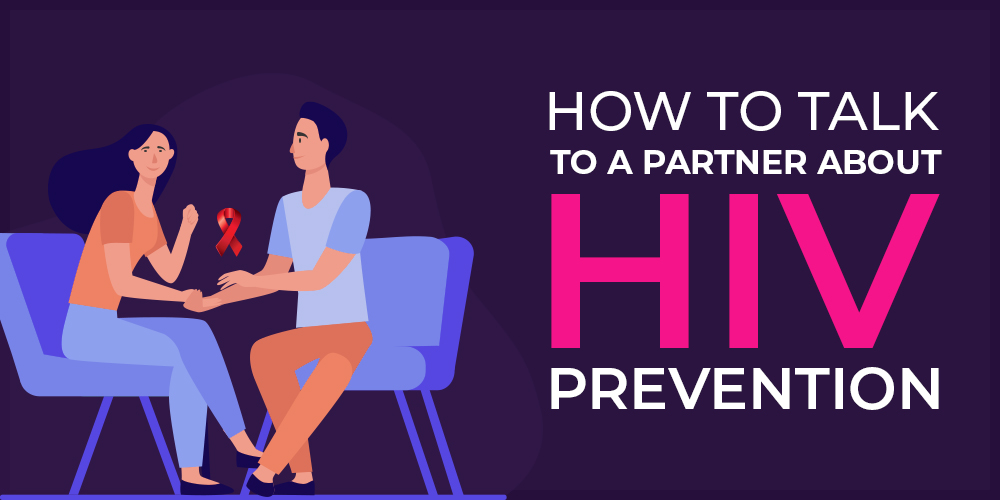
Talking about HIV prevention and transmission can be difficult. Unfortunately, there is still a lot of stigma around HIV. Many people tend to only discuss their HIV status with their doctor. However, it is very important to talk to a sexual or romantic partner about how to prevent HIV transmission.
HIV is transmitted from one person to another through bodily fluids, including blood, semen, rectal fluids, and vaginal secretions. Unprotected sex is considered to be the leading cause of HIV transmission. Having sex without a condom with a person who is living with HIV or whose HIV status is unknown puts the other person at risk. Additionally, sharing needles for intravenous drugs can cause HIV contraction.
According to the Centers for Disease Control (CDC), 66.6% of all new HIV diagnoses were due to unprotected male-to-male sexual contact. Twenty-four percent resulted from heterosexual contact and 11% from injection drug use.

If you are unsure of your partner’s HIV status or you believe you may be at risk of HIV transmission, it is important to talk about prevention methods.
Here’s how to get the conversation started.
1. Be Prepared to Start the Conversation

Talking about HIV prevention can be uncomfortable, especially if you are in a new relationship or you have not “defined” the relationship at all. But it is a necessary conversation to have if you or your partner is at risk.
One way to make it a bit easier to bring up the subject of HIV status with sexual partners is to be open about it from the very beginning. Thankfully some dating and gay hookup apps such as Grindr allow users to indicate information like their HIV status or whether or not they are taking PrEP. This can make it easier to determine your risk and bring up the conversation about HIV prevention with potential partners.
When it comes to talking to partners face to face though, it can be intimidating.
First, it is important to plan out how you will bring up the topic in a way that is comfortable for both of you. You want to create a safe environment where you both can be open and honest about your HIV transmission risk. You may not even need to talk face to face at all – if you are both comfortable, a conversation can happen over the phone or via text.
It may be best to start by telling your own experiences with HIV prevention or testing and then asking your partner to share. You can start the conversation by asking questions like:
- I got tested for HIV last year, but I need to get it again. When was the last time you were tested?
- I have never been tested for HIV and I’m nervous about it. Would you mind going with me?
- Before we go any further in the relationship, I think it’s a good idea for us to be tested for HIV. No matter what the results are, at least we can know our status to keep each other safe.
- I saw that there are new options for HIV testing. You can do it with an at-home test or at a mobile clinic, which is very convenient. Want to try it out with me?
The CDC also has a great list of conversation starters for talking about your HIV status, safe sex options, and discussing HIV treatment.
You must approach the subject without judgment towards your partner’s actions. Not everyone understands the importance of HIV prevention or getting tested. If your partner’s HIV status is unknown, they have not been tested in over a year, or they have engaged in at-risk behavior, you both should get tested as soon as possible.
2. Make HIV Prevention a Joint Effort
After you and your partner have been tested, it is important to continue the conversation about HIV prevention. Make sure that you are both on the same page and understand how to protect your partner from HIV transmission.
First and foremost, you both should consider talking to your doctor about taking PrEP for HIV transmission protection. PrEP can help to reduce the risk of transmission by up to 99%. If your partner is HIV positive or you are at a high risk of transmission, this is an important option to discuss with a doctor.
You should also discuss an HIV prevention plan with your partner and set boundaries as needed. For instance, one place to start sis by always using protection such as a condom during sexual intercourse.
Understand that you may also need to talk about your relationship expectations, such as being exclusive, seeing other people, or having an open relationship. If you and/or your partner are seeing other people, it could put you both at a higher risk of HIV transmission.
Again, this could create an uncomfortable situation – but it is far better to have an awkward discussion than to put each other’s health at risk.
3. Learn Together about HIV Transmission Prevention

Another way to make it easier to talk about HIV prevention with your partner is by learning more about the subject together. Many great organizations offer resources on ways to safeguard yourself from HIV transmission.
Here at PrEP Daily, we work with healthcare providers to connect people who are at risk of HIV transmission to get the help they need. We offer free educational resources about how to prevent HIV transmission and information on taking PrEP.
If you want to take PrEP to lower your chances of HIV transmission but you do not have health insurance, there are options. Organizations such as Advancing Access and the Patient Advocate Foundation offer payment assistance programs to cover some of the cost of the medication.
The most effective way to protect both you and your partner from HIV transmission is to work together. Be willing to learn and talk about prevention methods and hold each other accountable.
4. Remember: It Will Get Easier to Talk About

The more that you talk about HIV prevention, the more comfortable it will become. Talking about HIV can be scary or uncomfortable if you do not know much about it – but it is still a very important subject to talk about with your partner.
Be sure that you know the facts so you can have beneficial conversations to help others learn as well. Research what you can from online resources, connect with educators, and talk to your healthcare provider about HIV prevention. This is the best way to understand how to lower your HIV transmission risk and protect others, too.
5. What if I’ve Already Had Sex with Someone?
If you have already had sexual intercourse with a partner whose HIV status is unknown, it is important to get tested as soon as possible. If the partner is HIV positive, then you will need to begin HIV prevention treatment right away to stop the virus from spreading.
Your doctor may recommend that you consider taking PrEP or PEP to lower your risk of HIV transmission. PrEP is a medication regimen that is intended to prevent HIV before a sexual encounter. PEP uses the same medication to help prevent HIV after having sex with a person who is living with HIV.
PEP and PrEP can help to protect you from contracting HIV by stopping the virus from spreading in your body. The medication stops HIV cells from multiplying, which suppresses the viral load, or the amount of the virus in the body. If the viral load is low enough to be considered “undetectable”, then it is also untransmittable.
Conclusion
If you are wondering how to protect your partner from getting HIV as well as yourself, it is important to talk about prevention
Talking about HIV transmission risk is not the easiest conversation to have, but it is an important one. If you need help learning about HIV prevention methods, ways to start the conversation, or how to talk to your doctor about PrEP, please reach out to us at PrEP Daily.
We have a team of navigators that will work directly with you to answer any questions and get you in touch with a doctor in your area.

